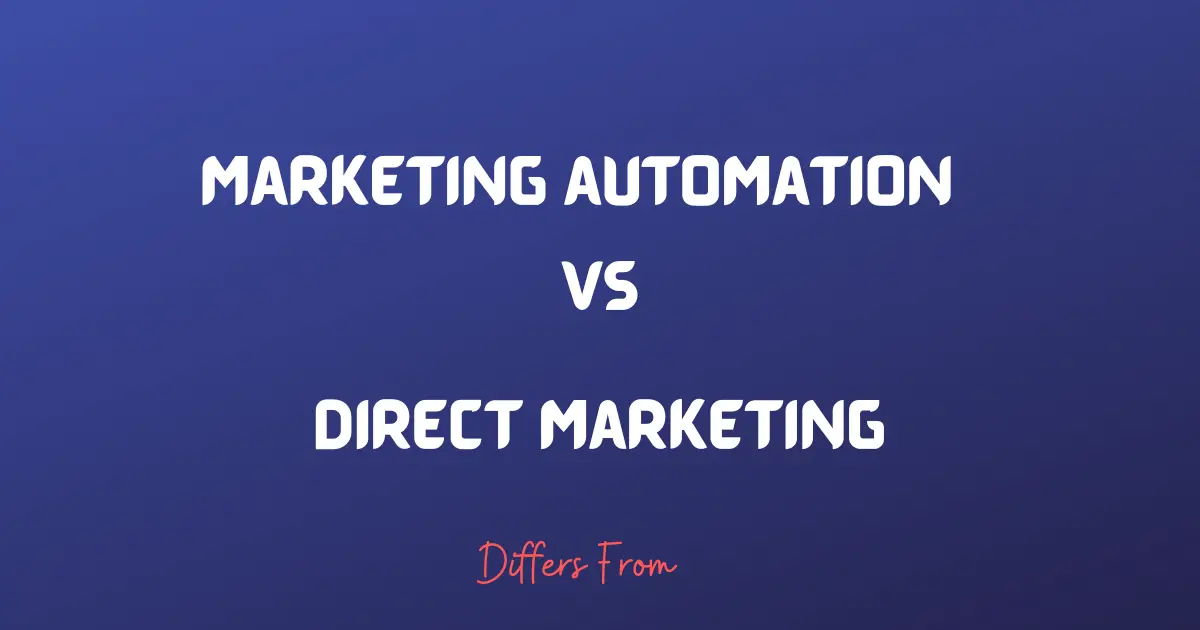Welcome to our blog where we simplify the world of marketing. Today, we’re going to unravel the distinctions between two essential marketing strategies: marketing automation and sales promotion.
Whether you’re a marketing enthusiast or a business owner, understanding these concepts will help you navigate the marketing landscape with confidence.
Let’s dive in!
Difference between marketing automation and sales promotion
| Marketing Automation | Sales Promotion | |
| Definition | Marketing automation refers to the use of software and technology to automate repetitive marketing tasks, such as email campaigns, lead nurturing, and customer segmentation. | Sales promotion includes various short-term marketing activities and incentives designed to boost sales, such as discounts, contests, or limited-time offers. |
| Focus | It primarily focuses on streamlining marketing processes, lead generation, and customer engagement. | It is geared toward increasing sales in the short term by offering incentives to customers. |
| Longevity | Typically, marketing automation strategies have a longer-term focus and aim to build relationships and brand loyalty over time. | Sales promotions are often short-lived and designed to create immediate sales spikes. |
| Tools and Technology | Relies on marketing software platforms to automate and optimize marketing activities. | Involves techniques like discounts, coupons, and contests, which may not require advanced technology. |
| Goals | The goal is to nurture leads, build brand awareness, and provide valuable content to potential customers. | The goal is to incentivize immediate purchases and create a sense of urgency. |
| Customer Relationship | Aims to build and maintain long-term customer relationships through personalized communication. | Often focused on attracting price-sensitive customers for short-term transactions. |
| Timing | Operates continuously, engaging customers throughout their buying journey. | Typically used during specific sales events or promotional campaigns. |
| Measurement | Metrics often include lead conversion rates, engagement metrics, and customer lifetime value. | Metrics focus on short-term sales increases, such as coupon redemption rates or sales volume during the promotion. |
| Customer Segmentation | Utilizes customer data for segmentation and personalized messaging. | Often has a broader target audience with less emphasis on segmentation. |
| Integration | Integrates with other marketing tools, like CRM systems, to provide a comprehensive view of the customer journey. | Typically, it can be implemented independently of other marketing strategies. |
What is a marketing automaton?
Marketing automation refers to the strategic implementation of software tools and processes that streamline and automate various marketing activities.
It enables businesses to effectively nurture leads, personalize messaging, schedule campaigns, and analyze data, resulting in enhanced efficiency, targeted communication, and improved customer engagement.
Ultimately, marketing automation empowers organizations to optimize their marketing efforts and drive better results.
What is sales promotion?
Sales promotion encompasses the tactical activities undertaken by businesses to stimulate immediate sales and boost customer engagement.
It involves the use of short-term incentives like discounts, coupons, contests, free samples, or limited-time offers to encourage consumers to make a purchase or take a desired action.
Sales promotion aims to create a sense of urgency and excitement, driving immediate sales growth and increasing brand visibility.
Comparison between marketing automation and sales promotion
Marketing is a multifaceted field, and two key strategies that often come into play are marketing automation and sales promotion. While both aim to drive business growth, they serve distinct purposes and are applied in different ways. Let’s break down the differences and similarities between these two vital marketing tools:
1. Core Purpose:
- Marketing Automation: This strategy focuses on streamlining and automating marketing processes, nurturing leads, and maintaining long-term customer relationships. It aims to provide personalized and valuable content to potential customers throughout their buying journey.
- Sales Promotion: Sales promotion, on the other hand, is geared towards boosting short-term sales through various tactics like discounts, limited-time offers, and incentives. Its primary objective is to create immediate sales spikes.
2. Timeline:
- Marketing Automation: Typically, marketing automation is a long-term approach that operates continuously to build and nurture relationships over time.
- Sales Promotion: Sales promotions are often short-lived and are strategically employed during specific campaigns, events, or seasons to generate quick sales results.
3. Tools and Technology:
- Marketing Automation: Relies on marketing software platforms to automate and optimize marketing activities, making use of customer data and segmentation.
- Sales Promotion: This involves techniques such as discounts, coupons, contests, and other promotional offers, which may not necessarily require advanced technology.
4. Customer Relationship:
- Marketing Automation: Focuses on fostering long-term customer relationships by providing relevant content and personalized communication at every stage of the customer journey.
- Sales Promotion: Concentrates on attracting price-sensitive customers for short-term transactions, with less emphasis on long-term relationships.
5. Measurement:
- Marketing Automation: Metrics include lead conversion rates, engagement metrics, customer lifetime value, and other long-term indicators.
- Sales Promotion: Metrics revolve around immediate sales impact, such as coupon redemption rates, sales volume during the promotion, and short-term ROI.
6. Integration:
- Marketing Automation: Often integrates with other marketing tools like CRM systems, providing a holistic view of the customer journey.
- Sales Promotion: This can be implemented independently of other marketing strategies and tools, depending on the specific promotional tactics used.
Conclusion
Marketing automation focuses on long-term relationship building, personalized messaging, and automating marketing processes for improved efficiency.
Sales promotion, on the other hand, aims for immediate sales boosts through short-term incentives and time-limited offers. Both strategies have distinct objectives and timeframes but can be integrated into comprehensive marketing strategies.
FAQs
What is the primary objective of marketing automation?
The main objective of marketing automation is to streamline marketing processes, nurture leads, and build long-term relationships with customers.
It aims to automate repetitive tasks, personalize messaging, and generate qualified leads for better conversion rates.
What is the main goal of sales promotion?
The primary goal of sales promotion is to stimulate immediate sales by offering incentives, discounts, or time-limited offers.
It focuses on creating a sense of urgency, attracting new customers, encouraging repeat purchases, and increasing brand visibility in the short term.
How does marketing automation differ from sales promotion in terms of timeframe?
Marketing automation focuses on long-term engagement and relationship building, nurturing leads over an extended period. In contrast, sales promotion aims for immediate results, often with time-bound offers that prompt customers to take immediate action.
Which strategy targets a broader audience, marketing automation, or sales promotion?
Marketing automation typically targets a broader audience, including both prospects and existing customers. It aims to engage and nurture leads throughout the customer journey. Sales promotion, on the other hand, often targets a specific segment or customer group with targeted offers.
How do marketing automation and sales promotion differ in their approach to customer relationships?
Marketing automation aims to build and nurture long-term customer relationships by delivering personalized content and maintaining ongoing communication.
Sales promotion, although it can generate immediate sales, is more transactional in nature and may not contribute significantly to long-term relationships.
Can marketing automation and sales promotion work together?
Yes, marketing automation and sales promotion can complement each other in an integrated marketing strategy.
Marketing automation can identify prospects who are more likely to respond to sales promotions, while sales promotion activities can help gather data for further personalization and nurturing through marketing automation.

